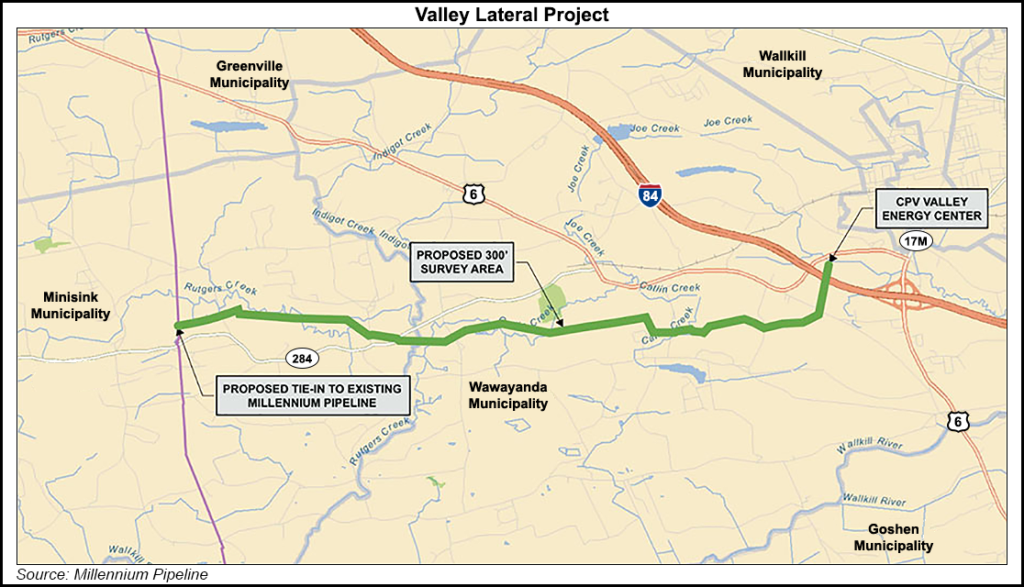Regulatory | Infrastructure | NGI The Weekly Gas Market Report
Saga Over Valley Lateral Ends With FERC Startup Approval
More than three years after first submitting an application to FERC, and after a bitter fight with state regulators, Millennium Pipeline Co. LLC’s Valley Lateral project officially entered service on Monday after receiving final authorization from the Federal Energy Regulatory Commission.

The 7.8-mile, 16-inch diameter Valley Lateral will deliver about 130 MMcf/d of natural gas from the Marcellus Shale to the Competitive Power Ventures (CPV) 680 MW Valley Energy Center plant that is nearing completion in Wawayanda, NY.
Millennium spokeswoman Michelle Hook told NGI’s Shale Daily that the company was “delighted” to have the project completed.
“This project will help to ensure the state’s electric grid is reliable when New Yorkers depend on it the most,” Hook said Tuesday. “The project was completed with a spotless environmental inspection record and we will now turn our attention to restoration in the communities we’re proud to call home.”
Hook said the CPV Valley Energy Center “needs to do some testing with our gas for a few weeks,” adding that the power plant was looking to begin full operations in early or mid-August. “But we will be supplying gas immediately for testing,” she said.
The long-running saga over the Valley Lateral began in April 2015, when Millennium first submitted an application with FERC for the project and kicked off the pre-filing review process [CP16-17]. One month later, Commission staff prepared a favorable environmental assessment for the project. FERC approved the Valley Lateral in November 2016.
But shortly thereafter, the project became bogged down after regulators with the New York State Department of Environmental Conservation (DEC) delayed issuing a critical water quality permit for the pipeline.
In June 2017, the U.S. Court of Appeals for the District of Columbia Circuit declined a request by Millennium to compel the DEC to issue the Section 401 Water Quality Certification (WQC), but advised the company to bypass the state agency and go directly to FERC, since the Commission had already approved the project. The next month, Millennium took the court’s advice and asked FERC for permission to proceed with construction of the pipeline, arguing that the DEC had waived its right to issue the WQC because it took too long to do so.
That touched off a regulatory turf war between the DEC and FERC, with the former arguing that it had until Aug. 30 to make a decision on the WQC. The DEC ultimately denied the WQC and other permits for the project, arguing that FERC failed to conduct a complete environmental review. But FERC struck back in mid-September, issuing an order that found the state agency had waived its authority to issue the certification.
FERC granted Millennium a one-year extension to build and start service on the Valley Lateral last October. In separate developments that same month, the DEC asked FERC for a rehearing and a stay of its September order and Millennium asked FERC for a notice to proceed (NTP) with construction. FERC granted the NTP on Oct. 27 and denied the DEC’s request for a rehearing and a stay in mid-November.
At that juncture, then-New York Attorney General Eric Schneiderman had filed a request for an emergency stay on behalf of the DEC, which was granted by the U.S. Court of Appeals for the Second Circuit. Millennium was finally allowed to begin construction in early December, after the Manhattan court declined to block the project.
Last January, the DEC again argued that FERC had erred when it determined the state agency had waived its right to issue the WQC and urged the Second Circuit to vacate the Commission’s order authorizing construction. A three-judge panel from the court rejected the DEC’s request in March.
The bitter dispute between FERC and the DEC caught the attention of the Trump administration. Last May, Department of Energy Secretary Rick Perry, during testimony before a House panel, questioned whether states have the right to block natural gas pipelines. Speculation rose that Trump could decide to issue an executive order that would rein in states opposed to pipelines, such as New Jersey and New York.
Millennium is jointly owned by affiliates of Columbia Pipeline Group, National Grid and DTE Energy.
© 2024 Natural Gas Intelligence. All rights reserved.
ISSN © 1532-1231 | ISSN © 1532-1266 |
